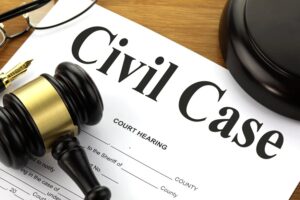Thus judges were not only prohibited from exercising any legislative or regulatory power, but their jurisdictional competence was limited to disputes between individuals .
Initially, disputes involving the Administration were settled by the Administration itself, and it was not until 1872 that another jurisdictional order was truly created , responsible for applying public law to disputes in which involved the Administration and public persons: thus was born the administrative jurisdictional order.
The separation between the administrative jurisdictional order and the judicial jurisdictional order remains today one of the fundamental and characteristic principles of French law.
Section 1. Judicial jurisdictional order
Q.Attention, in this context, “judicial” is opposed to “administrative”, while in another context, “judicial” can have another meaning.
For example, when we speak of the principle of the separation of powers, the judicial power is opposed to the legislative power and to the executive power: the term judicial refers here to the function of judging in general.
On the other hand, when we speak of the judiciary, it is to designate the courts which apply private law to disputes which do not involve the Administration.
You must therefore pay attention to the distinction: judiciary / judiciary.
General presentation: from the 1st instance to the cassation
The courts of the judicial order are organized into 3 levels:
the first instance,
the call,
the cassation.
The first instance
The courts of first instance hear cases for the first time. They examine them in fact and in law :
In fact: The objective here is to know what really happened. For this, the judges hear the people who oppose (the parties) or, more frequently, the lawyers who represent them and who give their own version of the facts.
Ex.Mrs. X claims that her husband is cheating on her with another woman. She is asking for a divorce. Mr. X denies these facts, and maintains that Mrs. X abandoned the marital home without reason. He wants the divorce petition to be dismissed.
Ms. X is here plaintiff in the divorce proceedings.
The judges will examine the various evidence produced by each of the parties (testimonials, letters, bailiff’s report, etc.) and will decide on the version of the facts which seems to them to be the best established.
Ex.In view of the various pieces of evidence, it appears that Mr. X indeed cheated on his wife by having extramarital relations with Ms. Y.
First of all, the judges will have to attribute to the facts that they have retained a qualification, that is to say that they will bring these facts into a predetermined legal category .
Ex.Here, it appears that the behavior of Mr. X can be qualified as a fault, because he committed a violation of the obligation of fidelity, which is one of the obligations of marriage provided for by article 212 of the Civil Code.
The judges will then have to find the rule of law that is applicable in the event of a fault committed by a spouse during the marriage.
Tax.Art. 242 of the Civil Code. : “ Divorce may be requested by one of the spouses when facts constituting a serious and repeated violation of the duties and obligations of marriage are attributable to his spouse and make the maintenance of common life intolerable



